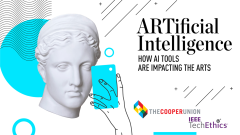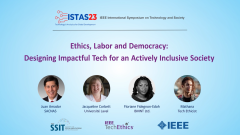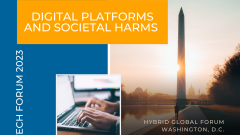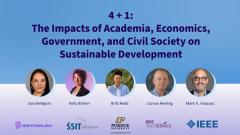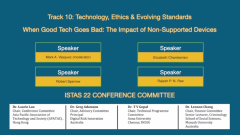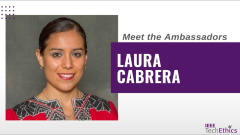About the Talk: From as far back as Ancient Egypt in 1500 B.C., humans have explored ways to regain functionality due to limb loss. In this panel, experts discuss how advancements in limb prosthetics are helping to shape what it means to be human.
About the Speakers:
Angel Giuffria was born missing her left forearm and hand. She is the youngest in the world on record to wear a myoelectric (muscle-controlled) prosthetic hand at 4 months of age. She always been self-motivated to find the best and most high-tech prosthetic devices available to her. She has also been persistent in her search for a prosthetist that will design devices for her that are not only functional but fun. She believes prosthetic devices need to be as individual to a person as a non-limb different person’s two hands, for Angel that includes remote controlled multi-colored lights, mini-bluetooth speakers, changeable aesthetic covers, a 360º rotating wrist, and other “cool” modifications. She has been featured on multiple television shows in the US & in the UK discussing prosthetic technology - including the Netflix show The White Rabbit Project. She is also a public speaker who travels the world discussing tech and disability, as well as an actress who has been in films like The Accountant, Hover, Hunger Ganges: Mockingjay Part 1 and TV shows like Amazon’s Goliath and Claws on TNT.
Oleg Pianykh is the Head of Foot Development and Project Management at the Salt Lake City R&D branch of Otto Bock HealthCare LP. In his role, Oleg is responsible for technical and strategic leadership of Ottobock’s prosthetic foot development activities. Ottobock is a privately-owned Germany-based company, founded in 1919, with its North American headquarters in Austin, Texas and R&D and manufacturing center in Salt Lake City, UT. Ottobock designs, develops and sells medical technology products and fitting solutions for people with limited mobility in the fields of prosthetics, orthotics and medical care service.
Laura Specker Sullivan, a specialist in interdisciplinary and cross-cultural ethics, is an Assistant Professor of philosophy at the College of Charleston. She has held fellowships at the Center for Bioethics, Harvard Medical School, the Center for Sensorimotor Neural Engineering, University of Washington, the National Core for Neuroethics, University of British Columbia, and the Kokoro Research Center, Kyoto University. She received her PhD in philosophy from the University of Hawaii at Manoa. She is currently the chair of the Neuroethics Affinity Group for the American Society for Bioethics and Humanities and a member of the Philosophy and Medicine committee of the American Philosophical Association.
Mark A. Vasquez (moderator) is a Certified Association Executive (CAE) with over 25 years of experience in association management at IEEE. He currently serves as the program manager for IEEE TechEthics (techethics.ieee.org), a program that has been launched to drive conversations about the ethical and societal impacts of technology. In this capacity, he works to develop relationships with others in the technology ethics community, produces events, convenes thought leaders, and more. Mark is an engineering graduate of The Cooper Union.
Recorded on 7 August 2018 as part of the IEEE TechEthics Conversations Series. This session was made possible in part by a grant from the IEEE Foundation.
About the Talk: From as far back as Ancient Egypt in 1500 B.C., humans have explored ways to regain functionality due to limb loss. In this panel, experts discuss how advancements in limb prosthetics are helping to shape what it means to be human.
 Cart
Cart Create Account
Create Account Sign In
Sign In
